Two Artists Pursue Passion for Science
Paths are rarely straight lines, and for those whose passions diverge among art and science, Purchase is truly the perfect place to be.
Georgie Humphries ’19 and April McIlwaine ’19 both faced a similar choice: pursue professional art training or a career in the sciences. Both were accepted to Purchase in art programs—Humphries is a visual artist and McIlwaine a dancer. Knowing their art practices would always be a part of them, they opted instead to study science in the hope to someday play a role in mitigating the looming impact of climate change.
They were both recognized this past September for their work at Purchase by the Westchester County Association at the annual Entrepreneurship in the Sciences event.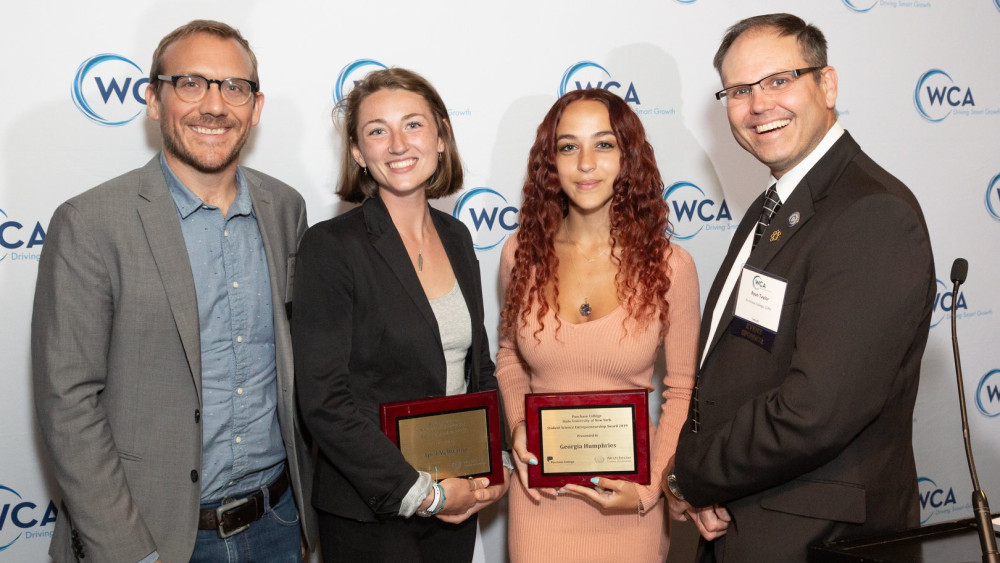
Frogs, Fungus, and Future Sequencing
April McIlwaine ’19 (biology) was serious about classical ballet. Even though the dance performance program here skews toward modern and contemporary along with classical, the Montpelier, VT native thought it would work for her. When she realized it wasn’t a good fit, she faced a crossroads: transfer out to another strictly classical ballet program or switch gears entirely. “I’ve always been passionate about science and especially conservation and environmentalism in general,” she says.
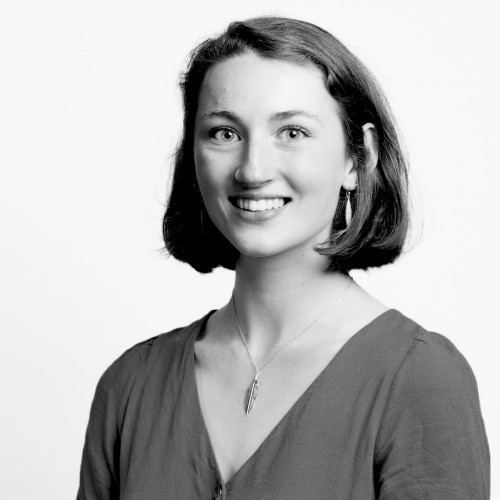
She pursued an internship with the Wildlife Conservation Society (WCS), digitizing their records. It’s where she first met Stephen Harris, assistant professor of biology, who eventually became her senior project advisor. Her senior project involved running DNA sequences on a specific fungus from skin swabs pulled from two species of high-altitude frogs in Peru that were showing different rates of decline. Researchers at the WCS provided her with the skin swabs. The chytrid fungus is adversely affecting amphibians and causing their global decline.
McIlwaine hoped to determine if there were any adaptations allowing the fungus to live at such a high altitude. In addition to sequencing chytrid, she was able to see distinct differences between the microbiomes of the two species and determined the species showing fewer declines had bacteria present known to be antifungal.
McIlwaine used a MinION sequencer, a technology new to Purchase and fairly new to the industry. It’s handheld and allows DNA sequencing in the field or in the lab. Since skin swabs have relatively low DNA per sample, part of her research first answered the question of whether it was even possible to get a sequence from the small amount of DNA available. She proved the answer was yes.
Harris writes that McIlwaine’s research “was the first ever use of this technology for that type of sample,” and adds, “April has shown that genome sequencing can be done from these swab samples and could allow other researchers to better track the spread of the fungus in the future.”
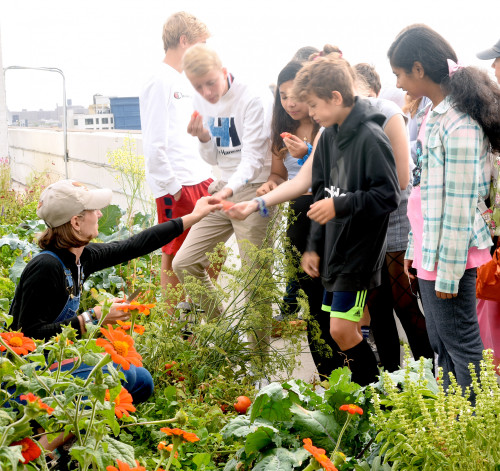
While at Purchase, she also performed research with the Hudson River Project and studied the coral reef in Roatán, Honduras with Jan Factor, professor of biology. After graduating, she did a lab-intensive internship at Neochromosome, Inc., a biotech startup in New York City.
She’s now working as a farmer and environmental educator at City Growers on a rooftop farm called the Brooklyn Grange as she prepares to apply to grad schools for fall 2020 admission.
While she’s still figuring out her path forward, she remains open. “Every time I do a new job I get a better idea of what exactly I want to do. I’m super interested in evolutionary biology and molecular ecology, which is similar to what my senior project was, but I also really enjoy teaching,” she says.
Harris believes McIlwaine’s openness is a key to her success. “She is interested in ecology, biology, and evolution, but is open to different avenues for a life sciences career and can see the benefit of taking opportunities as they arise. I find that extremely important when being successful in the natural sciences.” And regarding her use of the cutting-edge MinION sequencing technology, he says, “I believe she graduated with a skillset that is on par with many PhDs I know.”
So does she ever regret choosing science over dance? “Not really. I feel like I needed to do something that’s going to make as much of an impact to fix this super looming problem [climate change].” She continues to dance, but now, it’s just for fun.
Macroplastics and Tourism in Cyprus
Georgie Humphries ’19 applied to eight visual art schools and was accepted into seven—one of which was Purchase. Just as she was about to choose where to attend, she had a change of heart.
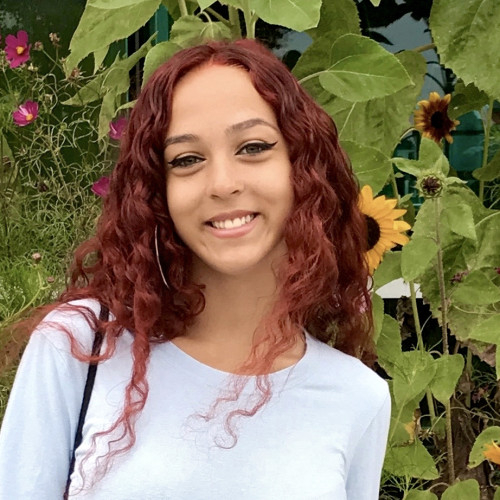
Humphries grew up in Queens, but is originally from Cyprus, where much of her family still lives. The tourism industry boomed there once the island nation joined the European Union in 2004—and so did their pollution problems. She spent a summer studying the accumulation of macroplastics in the Mediterranean and how it’s affecting their marine ecosystem. Through the Gilman International Scholarship program, she funded her internship and research abroad.
Working with the Cyprus Sustainable Tourism Initiative (CSTI), she visited coastal beaches, “logging each and every piece of littered plastic I found by origin and type. All recordings from each location were kept consistent by time, size, etc.” She hoped her research would answer the questions, “Is the plastic waste truly coming from the tourism industry? What socioeconomic regions are suffering the most? And what regulatory policies does one install to achieve true waste reduction?”
Her research is being used by the government of Cyprus to determine what regulatory measures should be placed on the tourism industry, and it garnered positive responses when presented to the tourism industry itself.
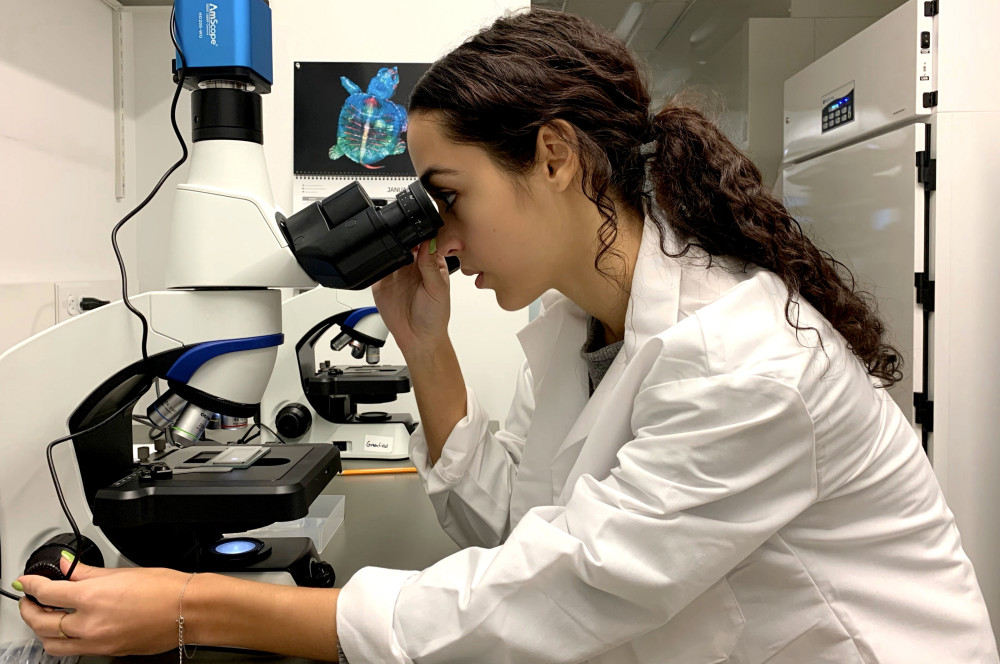
She’s also teaching undergraduate students at Queens College as an adjunct—her passion for teaching sparked by her experience tutoring in our School of Natural and Social Science’s Einstein Corner. “It soon became clear to me that learning how to adjust scientific concepts into easier to understand language is a special and useful skill. And avoiding doing so only leads to gate-keeping of true understanding,” she explains.
And she tapped her artistic talents when she could. Her conservation biology project, in which she presented ecological concepts for a non-science audience, impressed Assistant Professor of Environmental Studies Allyson Jackson. “Her large final project was a blog post about disease transmission in wildlife with original illustrations that showed her artistic prowess,” Jackson writes.
Humphries’ senior project earned the Student Science Entrepreneurship Award from Purchase in conjunction with the Westchester County Association. Not only did she design a replicable beach litter sampling and cataloging protocol, she trained a team of volunteers to help her and to continue the work after she returned to school. Taylor praises Humphries for her independence and motivation. “I’ve not had a student this dedicated, organized, and able to deliver on a timely fashion in a long time. [It] certainly explains how she graduated in three years, and how she got her research assistantship,” he says.
Jackson believes Humphries has a bright future. “Her unique background and perspective on international issues make her exactly the type of scientist that our field desperately needs.”
—Kristi McKee